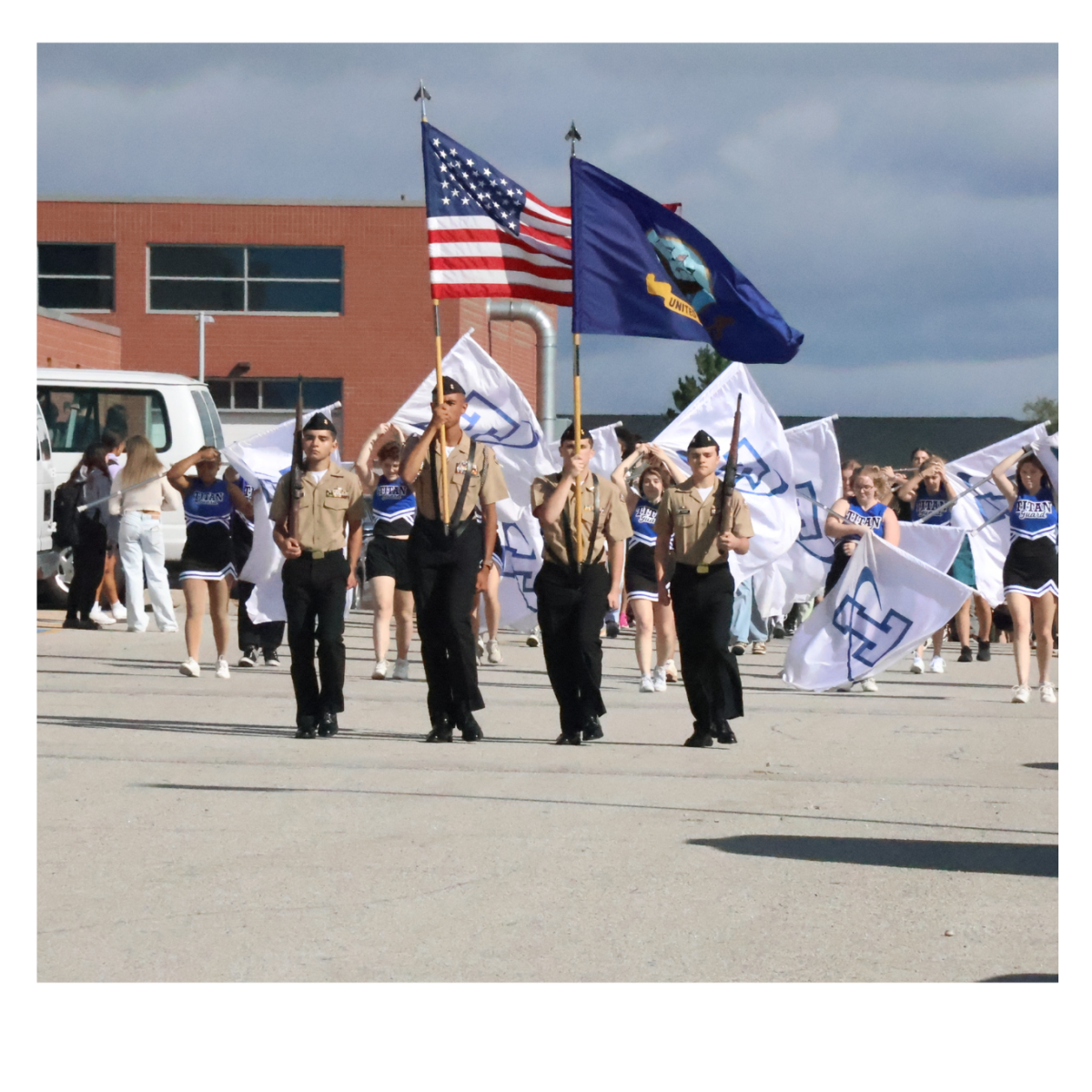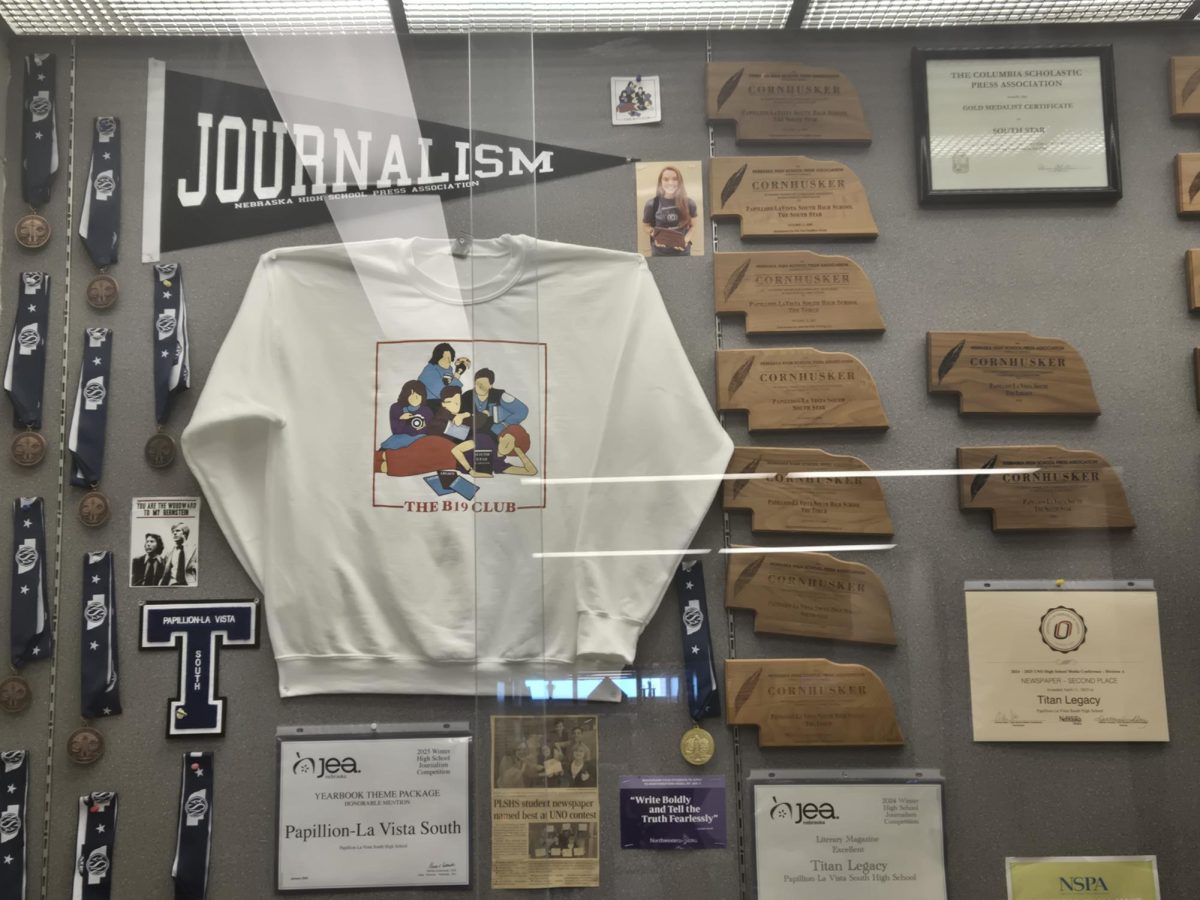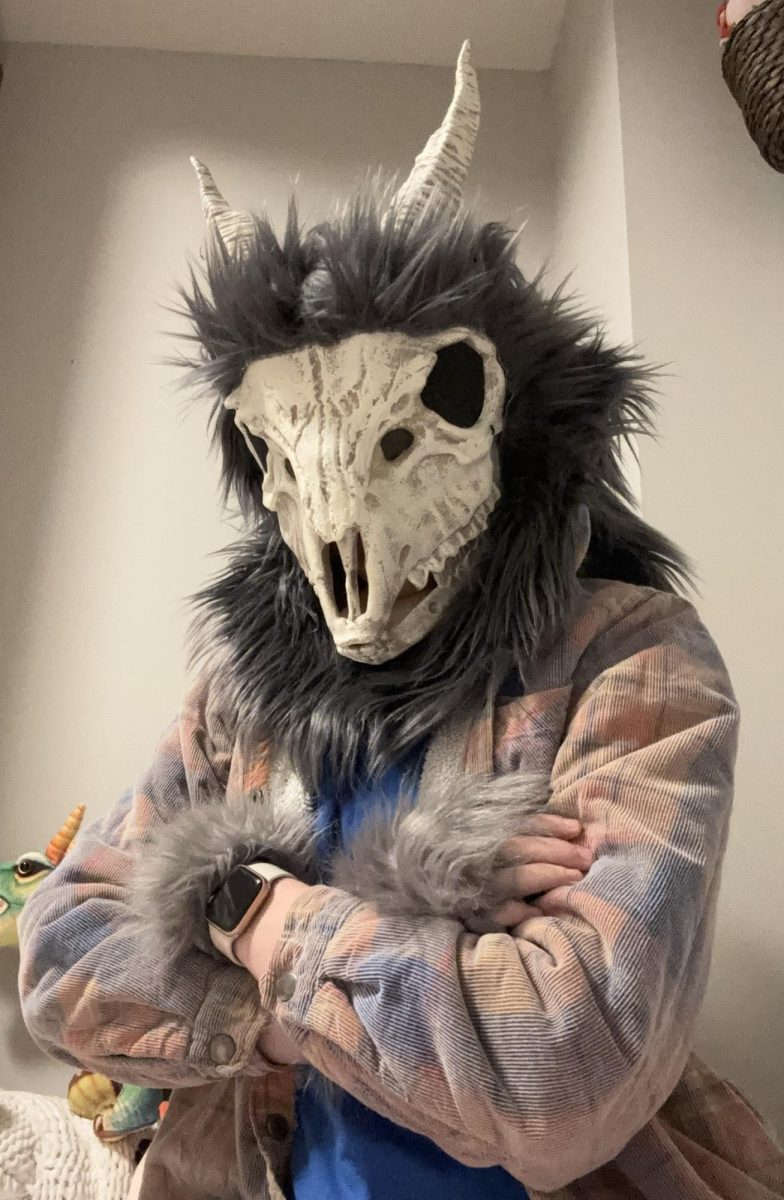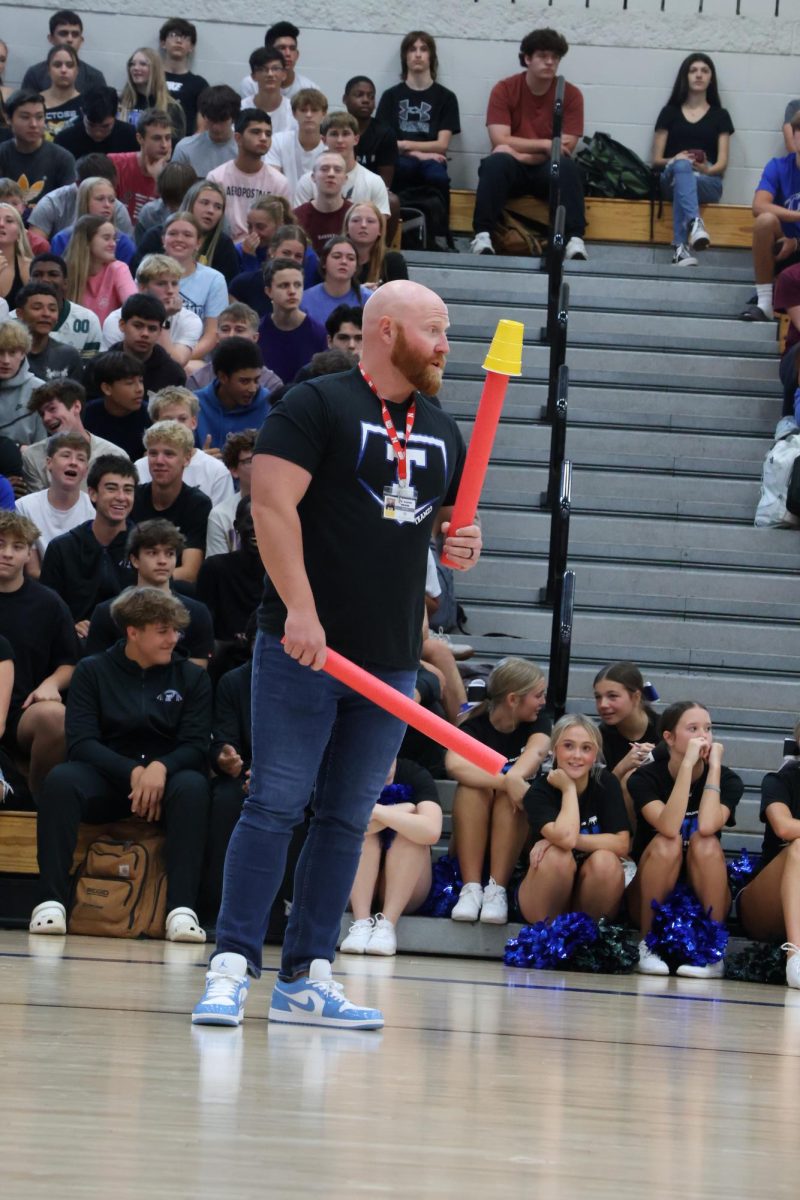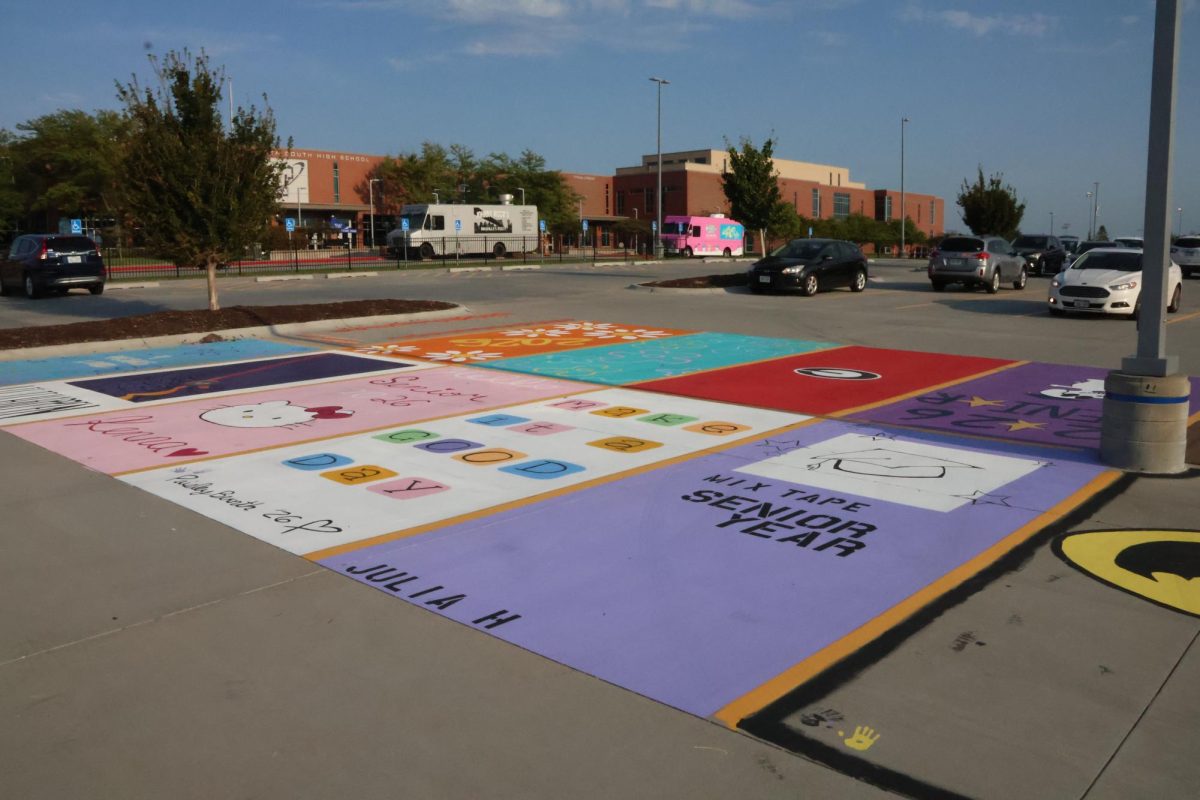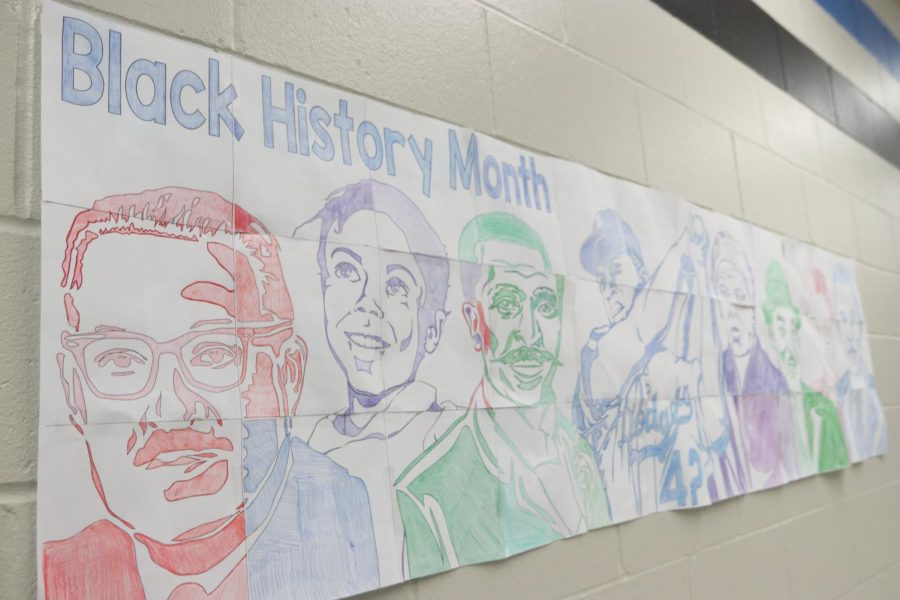GUEST COMMENTARY: Black History Is Truth That Must Be Told
A banner created by members of Young, Gifted and Black displays prominent figures from history for students passing through B hallway.
Social studies teacher Mr. JD Davis was asked to speak at the Papillion Mayor’s Youth Leadership Council’s inaugural Black History Month Celebration on Feb. 4. He shared these remarks in front of the full teaching staff of Papillion-La Vista South High School at the Feb. 20 Staff Development day, and gave permission to PLSouthside Scroll to reprint them here:
 When I first thought about what I wanted to convey to you today about Black History, I thought about my parents. I thought about the history that my parents exposed me to without me even realizing they were doing it. That is because we were living it in real time. What they taught me about Black history or history in general, for that matter, was good. Unfortunately, a lot of it was difficult to learn about.
When I first thought about what I wanted to convey to you today about Black History, I thought about my parents. I thought about the history that my parents exposed me to without me even realizing they were doing it. That is because we were living it in real time. What they taught me about Black history or history in general, for that matter, was good. Unfortunately, a lot of it was difficult to learn about.
Even when I say that now… “Black history or history in general”– it is very telling of the work still left to do. History should be all encompassing but it is not uniform. We are one of, if not THE most, diverse societies in the world and despite the difficult times, there is a full and enriching history behind it. Successes and failures. Trials and tribulations.
As a young child, I knew about the Civil Rights Movement. I didn’t quite understand what the movement was about, but I knew who Martin Luther King was. I was 3 ½ years old when he was assassinated. I remember 1968 like it was yesterday.
I was born in 1964, a few months after President Lyndon Johnson signed the Civil Rights Act. Even as a pre-school child, I knew there was so much going on. I knew there was something different about how black people were treated. I was an adult before I truly understood the depth of the struggle that occurred beforehand to make that historic day possible.
My parents were very community oriented. I can’t list all of the organizations that my parents were involved in, but to name a few, my mother was a member of Alpha Kappa Alpha Sorority, Incorporated. The first intercollegiate historically African American sorority (at Howard University). Later on in life (at age 60), my father became a member of Omega Psi Phi, Fraternity Inc., the first international fraternal organization founded on the campus of a historically black college (also at Howard University). My mother was one of the original members of the Jacksonville Chapter of Jack and Jill of America. Jack and Jill of America is a leadership organization that just celebrated its 85th anniversary on January 24th. It was formed by African American mothers to bring together children in a social and cultural environment. I spent all of my formative years through high school being involved in this organization. It was the perfect example of a village raising a child.
As a history teacher, I get excited to talk about history–all of it. I have always liked history, I just didn’t like my history classes. There was always something missing.
My enthusiasm stems from the fact that I realized there was a difference between the history that my parents taught me and exposed me to through general conversation and the history that was being taught in school. The difference was due to the gaps. There is an old quote thought to be from Winston Churchill, “History is written by the Victors.”
If you look at the history books from the 20th century, you might find that our history books greatly expanded on our successes, but glossed over our shortcomings. Those shortcomings generally dealt with how marginalized groups in our society were treated: American slavery, Japanese internment, anti-semitism, the treatment of indigenous people, immigrants, women, and the LGBTQ+ community.
History is not just about people, dates, events, and wars that we won. It is about relationships, shortcomings, mistakes. It is about celebrating successes through trying times. It is also about viewing the impact that historical events have. Understanding that the impact of historical events is not homogenous, so history must be taught from multiple perspectives.
This brings me to why Black History is so important. It fills in the gaps.
Our nation’s history is as diverse as our population, and we should celebrate the accomplishments and achievements of all of us. But in order to do that we must acknowledge the barriers that many African Americans faced. Black history is significant because there are countless circumstances where achievements were downplayed due to the sign of the times.
Let us not forget that it has taken time, effort and gradual acceptance of multiple perspectives to reverse the mindset that led to:
–400 years of slavery
–100 additional years of Jim Crow
–Social Darwinist views
–“scientific” studies that “proved” racial superiority
–Legal segregation at every walk of life
–sundown laws
–voter suppression and gerrymandering
–red lining
–the wanton lynchings of people like Emmett Till in Mississippi or Will Brown in Omaha
–the destruction of predominantly black towns such as Greenwood, Oklahoma, and Rosewood, Florida, etc., etc., etc.
And yet, despite the tremendous obstacles, and nearly 160 years after African Americans (due to slavery) were viewed as ⅗ of a person under the U.S. Constitution, African Americans have survived, thrived, and achieved success in every walk of life, in every profession.
As African Americans, we owe an endless amount of gratitude to those that paved the way for us to be able to live, work, and love freely. There are so many things that we unfortunately take for granted that were made possible, literally due to many people giving of themselves, their very lives in many cases, so that we may have it better than they had. We owe so much gratitude to them. We owe it to ourselves to remember our rich past. We owe it to our children, our grandchildren, and beyond to talk about our legacy as a people.
We must commemorate the sacrifices that people have made, and continue to make, for the struggle of social justice and civil rights. We must celebrate the accomplishments and triumphs of those who have risen above many cultural, economic, and educational obstacles that were brought on by institutional and governmental means, to reach what were thought to be impossible and unreachable heights in every possible position in our society. Black History should be celebrated every day because the struggle was truly real.
So, today, the question is how do we unite as a country?
First, and foremost, we must continue to educate our children about our history. ALL OF IT. By that, I mean we tell the truth. Despite what we hear on the news and among people who do not want to speak of the ills of our past while it seems as if they want to go back to the time when those very ills existed. That is the true meaning of being woke.
The term “woke” has become somewhat of a dirty word in some circles. By definition, according to Merriam-Webster, is “aware of and actively attentive to important societal facts and issues, especially issues of racial and social justice.” What does that say about people who claim to be and celebrate being anti-woke?
Our country is like one big family. As a part of that family, my parents did their best to do their part in leaving this world better than they found it. That is our responsibility now. We fail in that responsibility if we take credit for all the good but blame others for the bad that has happened.
I would like to read an excerpt from the preface of the book, “Unless We Tell It, It Never Gets Told,” by Rodney L. Hurst Sr. Mr. Hurst was one of the many contemporaries of my parents who was and continues to be a fighting force for civil rights and social justice. He is an example of living history, who, as a child, I did not realize how impactful he was in pushing hard for change.
“In the academic arena there is a saying, ‘If it is not written down, it did not happen,’ and Black history is seldom written on the pages of American history. Racism is also subject matter that does not make its way onto the pages of American history, and is often treated as a taboo subject or a four-letter word. Author and Atlantic columnist Ta-Nehisi Coates has said that, for Black people in America, racism is a physical experience of fear and violence. WE simply cannot afford to ignore stories about the legacy or Black history, and the legacy of the Civil Rights Movement any more. Those who tire of hearing about racism should ask yourselves, what if you were Black and had to live through the daily vulgarity of racism?
…
“Note to American history teachers, white and Black: Do not expect your Black students to learn from you history class if you do not incorporate Black history. If I sit in a classroom and only read about the contributions made by white Americans and white Europeans, then the ‘learning field’ is never level. It is downright dishonest that American history as portrayed in history textbooks essentially makes the statement that Blacks made no salient contributions to this country. My Black ancestors helped to develop this country before, during, and after slavery. You have to teach the truth without regard to what the textbooks proclaim. You are not teaching if you do otherwise.” [excerpted from “Unless We Tell It, It Never Gets Told,” by Rodney L. Hurst, Sr.]
Much of black history is celebrating the “firsts” because many of those firsts happened despite significant obstacles given the times when they occurred. These “firsts” remind us and encourage us that while times have improved, the work is never done.
I’m still a little bitter about my Jaguars losing to the eventual Super Bowl champion Kansas City Chiefs and while football may still be somewhat fresh in our minds, I thought I would provide a snapshot of little known football history.
I always thought Art Shell was named the first African American coach in the NFL in 1989. Tony Dungy was the first African American coach to be inducted into the NFL Hall of Fame in 2016.
I was wrong.
Frederick Douglass “Fritz” Pollard was an American football player and coach. He played professional football with the Akron Pros, the team he would lead to the APFA championship in 1920. In 1921, he became the co-head coach of the Akron Pros, while still maintaining his roster position as running back, becoming the first African-American head coach in the National Football League. He played for five other professional teams and some sources indicate that Pollard also served as co-coach for one of those teams, the Milwaukee Badgers for part of the 1922 season.
Unfortunately, Pollard, along with 9 other African American NFL players were removed from the league in 1926. After their departure, the NFL owners imposed a “gentleman’s agreement” that prevented the signing of black players into the league. The NFL was not re-integrated until 1946. He was posthumously inducted into the NFL Hall of Fame in 2005.
The significance of this achievement stems from the time in history that this occurred. The 1920s. The height of the Ku Klux Klan, Jim Crow segregation, and racial tension and violence with little to no government intervention unless it was directed at African Americans. This is history.
If fear and discomfort take over how our history is told, then our history and education, for that matter, is in deep peril. When political leaders, in pushing a narrow agenda, dare to say there is no educational value in courses created by true experts in teaching about a major part in our history, we are all at risk.
In closing, I would like to re-emphasize that in order for us to unite as a country we have to have a reconciliation with our past. We cannot have reconciliation unless we have the truth. Black History is Truth. So we must commemorate it.
We must celebrate it. In order for us to have a fighting chance at being united, we must tell it or it never gets told.
Your donation will support the student journalists of Papillion-La Vista South High School. Your contribution will allow us to purchase equipment and cover our annual website hosting costs.

Hello! My name is Paige Miller. I’m a junior, and this is my first year on staff for Titan Legacy and South Star yearbook. I do photography, writing,...


![Pictured above is a structure that displays the names of Nebraska Vietnam veterans in order to “honor [their] courage, sacrifice and devotion to duty and country.”](https://plsouthsidescroll.com/wp-content/uploads/2025/10/Trey_092625_0014-e1760030641144-1200x490.jpg)
